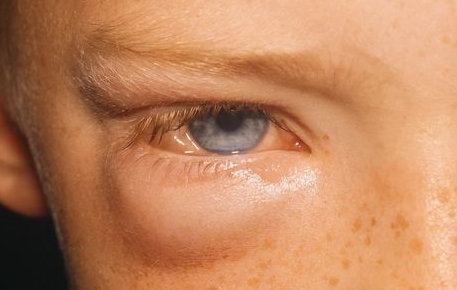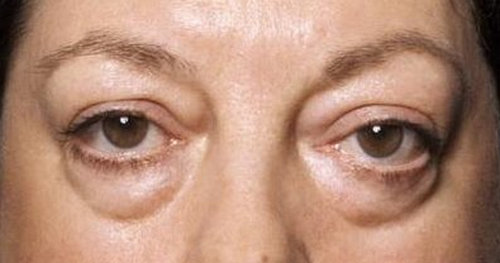Swelling Under Eye
Last reviewed by Dr. Raj MD on January 12th, 2022.
Swelling of the eyes is medically known as periorbital puffiness (1). It indicates presence of excess fluid in the connective tissues surrounding the eyes.
Swelling can be easily noticed denoting that something is unusual around the eyes. There are a lot of organs in the body, but one of the most sensitive organs is the eye. Any damage involving the eyes can have a serious effect on your vision.
Causes of swelling under eyes
There are so many reasons why the areas under the eyes swell. It is important to determine the cause of the swelling in order to treat the condition (1, 2). The usual causes of swelling under the eyes include the following:
- Allergic reaction
- Viral infection
- Trauma to the eyes
- Exposure to irritants
- Fluid retention brought by menstruation, pregnancy, and hormonal changes
- Severe infection of the eye that leads to pain and tenderness of the muscles surrounding the eyes
- Skin disorders like eczema and psoriasis
- Insufficient production of thyroid hormone or hypothyroidism
- Insufficient sleep/over sleeping causing eye strains
- Crying, which increases the flow of blood in the eye areas
- Substance abuse like smoking, alcoholism, and drug use
- Highly salty diet leading to fluid retention in the muscles under the eyes
- Contagious infection of the eye like conjunctivitis and inflamed sebaceous gland near the base of the eyelid such as styes (3)
- Heredity

Picture 1 : A noticeable swelling under the left eye
Photo Source : s-media-cache-ak0.pinimg.com

Image 2 : Swelling under the eye involving both left and right eye.
Photo Source : 1.bp.blogspot.com
Associated Symptoms
- Eye pain
- Blurring of vision
- Discomfort around the eyes
- Noticeable swelling and redness around the eyes
- A burning sensation around the eyes
- Feeling like something unusual is in the eyes
- Fever
- Headaches
- Saggy or loose skin (4)
- Dark circles
Why the area under the eyes usually Swell in the morning?
When you wake up in the morning and see your reflection on the mirror, what is the first thing you notice? Did you notice that the area under the eye swells? Well, this is just a normal condition. When you sleep, you don’t blink leading to eye puffiness.
Blinking of the eye is comparable to walking for the legs. It is an exercise for the eyes. As soon as you open your eyes and start to blink, the swelling gradually disappears. (2, 3)
When does eye puffiness become a medical condition?
When the swelling under the eye occurs unexpectedly, then it is suggestive of underlying medical condition. Swelling under the eye along with bulging of the eyes are indicative of thyroid-related disease specifically Grave’s disease (4, 5).
Swelling can be related to eye allergies along with hay fever. Swelling under the eyes can also be associated with systemic disease like kidney failure. If you have a problem with your kidney, you will experience fluid retention. It is the reason why your body swells including the areas surrounding the eyes.
Treatment for swelling under eye
- The swelling under the eye can be alleviated using over the counter medications. However, it is important for you to seek medical advice before using any types of medications for the eyes.
- If the swelling is caused by allergy, then it should be treated using oral antihistamines and/or decongestants.
- An eye drop should be used too. If the swelling is caused by bacteria, an antibiotic should be used. (6)
Therapies
To significantly improve the appearance of puffiness under the eyes, various wrinkle treatments can be used such as laser resurfacing, fillers, and chemical peels. These procedures help tighten the skin, improve the color of the skin, and rejuvenates the bags under the eyes.
Home Remedies
- Make sure you keep your head elevated to reduce the flow of blood in the area surrounding the eyes. (8)
- Do not rub the eyes to prevent further irritation.
- A cold ice pack could help alleviate the swelling. (9)
- You have to modify your diet and limit the intake of sodium-rich foods.
- Increase your intake of essential vitamins and minerals.
- Keep your body hydrated by drinking plenty of water.
- Make sure you get enough sleep at night. (8, 9)
- Try to use puffy eye creams. Choose soothing eye cream, especially the one containing vitamin E and aloe. You can also wear eye mask to apply mild pressure to the eyes at night.
- You can put cold cucumber on the surface of the eyes to significantly reduce eye puffiness. However, you have to remember that it is the coldness of the cucumber that alleviates swelling and not the cucumber itself.
- You might want to consider using a haemorrhoid cream for eye puffiness. The cream contains ingredients that help constrict the blood vessels thereby reducing puffiness and swelling.
- However, you should be cautious when using the cream on sensitive skin such as the areas around the eyes. To be safe, always ask the advice of your eye doctor before using any kinds of medications for the eyes, be it a topical ointment or something that should be ingested. (8, 9)
When should you seek medical attention for Swelling under the eye?
Swelling of the eyes, especially if the onset is sudden can be an indicator of a serious health problem. The same thing goes for persistent swelling of the area under the eyes. Hence, you have to seek medical attention right away.
If you receive a blow to the eye or your eye gets infected, you should immediately visit your doctor even if you hadn’t notice any swelling. This is to detect and prevent further damage to the eyes. (6, 7)
If the area under the eye swells along with fever and difficulty breathing, then it is an emergency situation that warrants immediate medical attention. Redness around the eyes, swelling in the face and neck areas, and fever and chills are all indicators of major health problems.
Not immediately seeing a medical professional could have a devastating effect on your vision and health as a whole. Call 911 right away or schedule an appointment with your eye doctor.
Never attempt to drive if the swelling under the eye obstructs your vision or you are experiencing vision problems. (7)
References:
- www.mayoclinic.org
- www.medicinenet.com
- www.allaboutvision.com
- www.instah.com
- www.eyehealthweb.com
- www.ourhealth.com
- www.healthgrades.com
- www.livestrong.com
- www.top10homeremedies.com